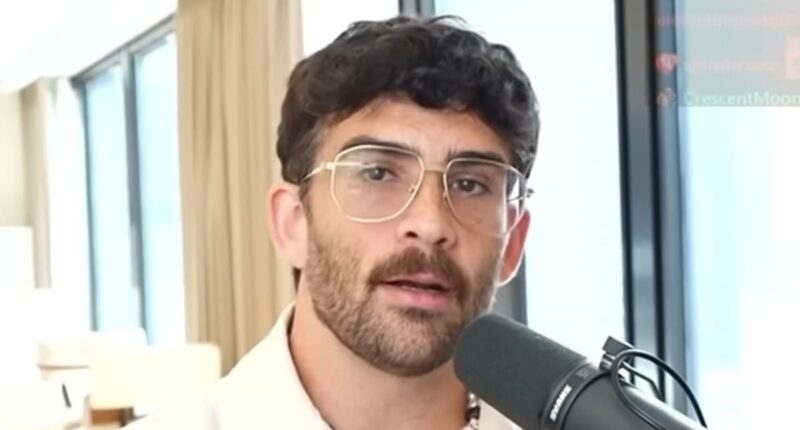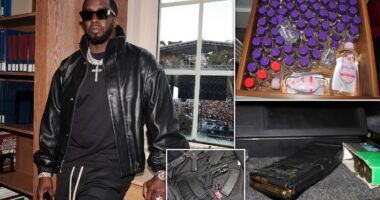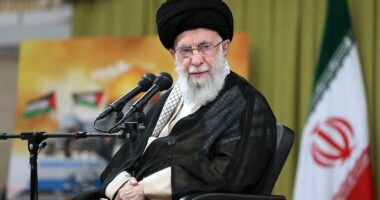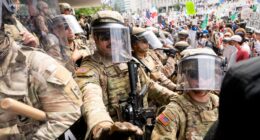
Hasan Piker, a well-known political streamer, revealed that his progressive beliefs led to him being detained by officials from US Customs and Border Protection (CBP) at O’Hare International Airport in Chicago.
Upon his arrival back from Paris on Sunday, Piker, also known as HasanAbi, recounted being approached by border patrol officers even before he could complete the re-entry process using Global Entry.
In a Monday video, Piker said the agent who interrogated him first asked about what he did for a living.
Despite emphasizing his American citizenship, Piker explained that the situation quickly escalated to inquiries about his content on various online platforms and whether he discusses topics related to President Donald Trump.
The question about Trump was what got Piker to question the motives of the agent, he said.
‘That was the first time where I was like, “What is this question?”‘ he recalled. ‘I literally straight up told him, “Why are you asking me this?”‘
That didn’t stop Piker from sharing his opinion on Trump, telling the agent, ‘I don’t like Trump. What are you going to do? It’s protected by the First Amendment. I don’t like Trump.’
‘Nothing I’ve done online is illegal as of now,’ he added. ‘Now laws may change in the future and they might actually start prosecuting speech, which I do fear is the goal of this administration. But so far, everything I’ve done is fully protected under the First Amendment.’
In a statement to The Hill, Tricia McLaughlin, Homeland Security assistant secretary, denied that Piker was scrutinized because of his political beliefs.
‘This is nothing but lying for likes. Claims that his political beliefs triggered the inspection are baseless. Our officers are following the law, not agendas,’ McLaughlin said.
‘Upon entering the country, this individual was referred for further inspection — a routine, lawful process that occurs daily, and can apply for any traveler. Once his inspection was complete, he was promptly released,’ she added.
Piker concluded that the real reason for CBP pulled him aside was so they could investigate his suspected ties to terrorist organizations in the Middle East, including Hamas, the Houthis and Hezbollah.
Piker denies any direct connection or involvement with any of these groups, however, he did receive backlash earlier this year for doing an interview with Rashid Al Haddad, a 19-year-old thought to be a member of the Houthis.
The Houthis have been designated a terrorist group by the US. They primarily operate in Yemen and have been attacking cargo ships and military vessels traveling through the Red Sea in order to disrupt Israel’s war effort against Hamas.
In Piker’s interview with Haddad, who has been nicknamed ‘Tim-Houthi Chalamet’ for his resemblance to the American actor, the young man said he wasn’t a fighting soldier for the Houthis.
A picture of him later emerged showing him standing on a hill overlooking fields and villages below with an AK-47 rifle slung over his shoulder.
Also, when Haddad was later asked by one of his Instagram followers if he was soldier, he responded ‘yes.’
Piker said he was asked about this incident specifically, to which he told the CBP agent that the man he interviewed was not a Houthi and was simply a regular Yemeni citizen.
Piker added that even if he had interviewed a Houthi or any other member of a terror group, it would be his right to do so as an act of journalism.
Piker said the CBP agent repeatedly asked him whether he ‘liked’ or ‘supported’ Hamas. He also said he was asked if he viewed Hamas as a resistance group or a terrorist group.
Piker said he responded either by saying he is on the side of civilians and wants the bloodshed to stop, or by saying the State Department recognizes Hamas as a terrorist organization.
According to Piker, the agent then refocused on the Houthis, asking him whether he agrees that they should be designated as terrorists.
‘I said I’m of the Brookings Institution mindset that in 2020 when Donald Trump initially designated the Houthis as a terror organization that that was a major mistake,’ Piker recalled.
The Brookings Institution, a liberal think tank, did in in fact argue it was a mistake for the first Trump administration to officially declare the Houthis terrorists.
‘Designating the Houthis would be bad for Yemeni civilians, bad for peace talks, and, ultimately, bad for U.S. national security. It would also box-in President-Elect Biden before he even takes the oath of office, although perhaps that’s part of the attraction for exiting Trump officials,’ Brookings analyst Gregory D. Johnsen wrote on November 25, 2020.
Piker said the agent eventually ‘gave up’ when he kept saying that what he’s said online is protected speech under the US Constitution.
The conversation between him and the agent, which Piker said lasted about two hours, abruptly ended when he eventually asked if he was being detained and if he could freely walk out.

















